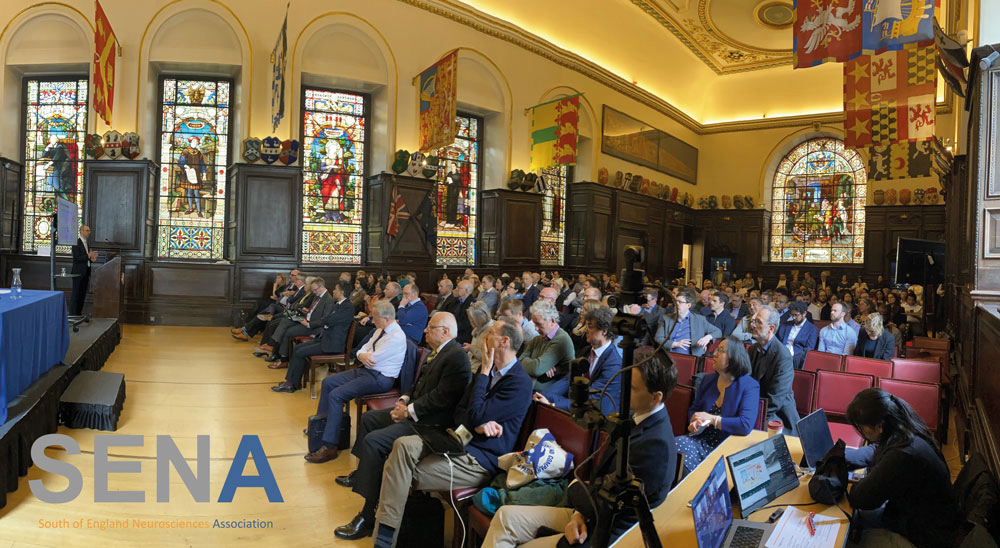The South of England Neurosciences Association (SENA) Meeting occurred on Friday 26th April 2024 and was hosted by the Royal Free Hospital, London. The meeting was held at the historic Stationers’ Hall in central London. The programme featured world-renowned speakers covering topics from cross-disciplinary specialities.

The day consisted of engaging talks with speakers generously sharing their personal and clinical experience with the audience. It was inspirational to hear about the cutting-edge research and translational medicine led by our esteemed speakers.
The morning commenced with a fascinating talk from Dr Rebecca Liu, Neurologist, detailing her experience helping to look after the first patient treated for Ebola in the UK. Dr Liu offered a glimpse into the incredible teamwork which went on behind the scenes across the country to deliver monoclonal antibody therapeutics and experimental treatment in record time.
Dr Jane Macnaughtan, Hepatologist, spoke about the neurological presentations of hepatic disease. We were given a refresher on hepatic encephalopathy, hepatic myelopathy and Wilson’s disease, all important diagnoses with treatments available and not to be overlooked on the ward.
Amyloid expert, Prof Julian Gilmore provided an update on ATTR transthyretin amyloidosis. We were given an overview of the exciting gene editing and disease modifying treatments which will revolutionise the treatment of this condition. We were reminded to consider amyloid as a differential in the patient without diabetes, presenting with neuropathy and autonomic symptoms.
The afternoon session kicked off with brilliant cases presented by neurology trainees across South and South East England, all of whom shared interesting and unusual cases from the wards. The cases included a communicating hydrocephalus caused by normal pressure hydrocephalus and vestibular schwannoma; facial nerve baroparesis on board a flight; cavernous sinus haemangioma presenting with multiple cranial neuropathies during pregnancy; bilateral opercular syndrome diagnosed with a bedside dad’s joke (!); “triple M” syndrome (myasthenia, myositis, myocarditis) and CNS lymphoma, the mimicker.
Dr Ann Donnelly, Neurologist, provided an update on best practice management of spasticity, an often-overlooked symptom which afflicts many of our patients. The important practice points were to ensure antispasticity drugs are trialled at maximally-tolerated doses and early referral to specialists for consideration of parenteral therapies.
Prof Anthony Schipara, Neurologist, provided an overview of the familial and genetic Parkinson syndromes and the work he has been leading in phase two trials on LRKK2 inhibitor and GLP1 agonist therapy. This was an exciting look into the field of disease modifying therapy for patients with Parkinson syndromes.
Prof Huw Morris, Neurologist, detailed his work on biomarkers, both current and emerging, which will help to standardise diagnosis of Parkinson-plus syndromes. These biomarkers will undoubtedly have a role to play in the monitoring of progression and treatment response.
Dr Jonathan Kennedy, Neurologist, provided an important update on the disease modifying therapies which will revolutionise the treatment of people living with Alzheimer’s and dementia. This area is dynamic, with the addition of new therapies to our armamentarium hopefully imminent in the UK.
We were treated to an entertaining debate between Neurologists, Dr Ben Turner and Dr Adrian Wills, who argued for and against neurologists managing acute neurology in the emergency department, respectively. Both speakers presented masterful arguments on the merits of specialism versus generalism.
The day concluded with a special talk from Prof Steve Powis, National Director of NHS England. Prof Powis provided a “state-of-the-NHS” address post-COVID19 and emphasised the importance of primary prevention, the backbone of our health care system.
Overall, the day provided a stimulating and informative discussion of many “hot topics” in neurology. The advent of gene editing, disease modifying treatments and personalised medicine are the future for neurology – watch this space!
Many thanks to Royal Free Hospital Neurologists, Dr Ann Donnelly, Prof Huw Morris and Dr Bob Brenner for putting on this fantastic programme.